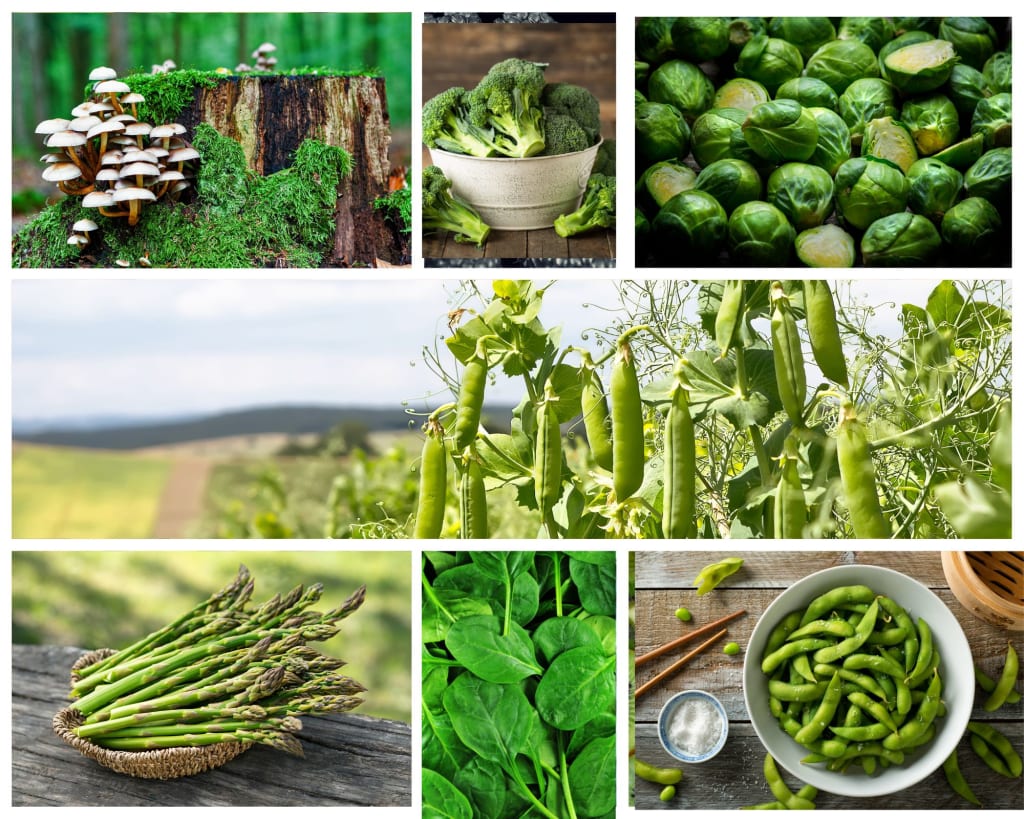Exploring the Health Benefits of Vegetables and Discover the Protein Powerhouses: Vegetables That Rival Eggs in Protein Content
Nourishing Nature's Bounty: Unveiling the Health Advantages of Vegetables and Unearthing the Protein Powerhouses Vegetable Titans That Outshine Eggs in Protein Density

Exploring the Health Benefits of Vegetables and Discover the Protein Powerhouses: Vegetables That Rival Eggs in Protein Content
Vegetables are nature's gift to us, offering an abundance of flavors, colors, and textures that can transform any dish. But their appeal goes beyond taste and aesthetics. These nutritional powerhouses are packed with essential vitamins, minerals, and fiber, making them an indispensable component of a healthy and balanced diet. In this article, we will delve into the myriad benefits of vegetables, exploring their impact on overall health and well-being.
A Wealth of Vitamins and Minerals:
Vegetables are a treasure trove of essential vitamins and minerals, providing the body with the necessary tools for optimal functioning. Leafy greens like spinach and kale are rich in vitamin K, which supports bone health and blood clotting. Colorful vegetables such as bell peppers and carrots are loaded with vitamin C, known for its immune-boosting properties. Moreover, vegetables like broccoli and Brussels sprouts are excellent sources of folate, a crucial nutrient for cell growth and development.
Fiber for Digestive Health:
Fiber is a key component of a healthy digestive system, and vegetables are an excellent source of this vital nutrient. High-fiber vegetables, including broccoli, cauliflower, and sweet potatoes, promote regular bowel movements and help prevent constipation. Additionally, fiber-rich vegetables contribute to a feeling of fullness, aiding in weight management and controlling blood sugar levels.
Antioxidant Powerhouses:
Vegetables are renowned for their high antioxidant content, which helps protect our bodies from harmful free radicals. Antioxidants neutralize these free radicals, reducing the risk of chronic diseases such as heart disease, cancer, and neurodegenerative disorders. Tomatoes, for example, contain lycopene, a powerful antioxidant that has been linked to a lower risk of certain cancers. Similarly, cruciferous vegetables like cauliflower and cabbage are packed with sulforaphane, a compound known for its cancer-fighting properties.
Heart-Healthy Choices:
Including a variety of vegetables in your diet can significantly benefit heart health. Many vegetables, such as leafy greens, tomatoes, and bell peppers, contain heart-friendly nutrients like potassium, which helps regulate blood pressure. Moreover, the fiber content in vegetables aids in reducing cholesterol levels, thereby lowering the risk of heart disease. A diet rich in vegetables has been associated with a reduced incidence of cardiovascular conditions.
Weight Management and Blood Sugar Control:
For those aiming to manage their weight or control blood sugar levels, vegetables are an ideal choice. Low in calories and high in fiber, vegetables provide satiety without adding excessive calories to your diet. Replacing calorie-dense foods with vegetables can help create a calorie deficit and support weight loss efforts. Additionally, the fiber in vegetables slows down the absorption of sugars, contributing to stable blood sugar levels and reducing the risk of type 2 diabetes.
The importance of incorporating vegetables into our daily meals cannot be overstated. From their impressive array of vitamins and minerals to their disease-fighting antioxidants and heart-healthy properties, vegetables offer a myriad of benefits for overall health and well-being. So, let's embrace the vibrant colors and flavors of vegetables, making them a cornerstone of our diets and reaping the rewards they bestow upon us. Remember, with every crunchy bite of a carrot or a refreshing crunch of a cucumber, you're nourishing your body and taking a step towards a healthier, more vibrant life.
Discover the Protein Powerhouses: Vegetables That Rival Eggs in Protein Content
Protein is an essential macronutrient that plays a crucial role in building and repairing tissues, supporting immune function, and maintaining overall health. While eggs have long been considered a primary source of protein, many vegetables surprisingly offer substantial amounts of this vital nutrient. If you're looking to increase your protein intake while following a vegetarian or vegan diet, or simply seeking alternative protein sources, you'll be thrilled to learn about the vegetables that can compete with eggs in terms of protein content. In this article, we'll explore some protein powerhouses from the plant kingdom that can be incorporated into your meals to meet your protein needs.
Edamame:
Edamame, young soybeans, are not only a popular appetizer but also an excellent source of protein. These green pods pack approximately 18 grams of protein per cooked cup, equivalent to the protein content found in about three large eggs. They are also rich in essential amino acids, fiber, and various vitamins and minerals, making them a nutritious addition to your diet.
Spinach:
Known for its iron content, spinach is also a surprising source of protein. This leafy green vegetable contains about 5 grams of protein per cooked cup, which is comparable to the protein content of a small egg. Incorporating spinach into your salads, smoothies, or sautéed dishes can not only boost your protein intake but also provide other beneficial nutrients like vitamins A, C, and K, as well as folate.
Broccoli:
Broccoli, a cruciferous vegetable with numerous health benefits, is not typically associated with high protein content. However, it contains approximately 3 grams of protein per cooked cup, which is similar to the protein content of a small egg. Moreover, broccoli offers a host of vitamins, minerals, and antioxidants that contribute to overall well-being.
Brussels Sprouts:
Often served as a side dish, Brussels sprouts provide a surprising amount of protein. With around 4 grams of protein per cooked cup, these miniature cabbage-like vegetables rival the protein content of a small egg. They are also loaded with fiber, vitamin C, and vitamin K, making them a nutritious addition to any meal.
Asparagus:
Asparagus, a flavorful and versatile vegetable, offers not only a low-calorie option but also a reasonable protein content. With approximately 4 grams of protein per cooked cup, asparagus can be considered on par with a small egg in terms of protein. Additionally, it contains essential nutrients like folate, vitamin K, and antioxidants.
Conclusion:
While eggs have long been recognized as a protein-rich food, several vegetables can match or even surpass their protein content. Incorporating these vegetables into your diet can provide an excellent plant-based protein alternative, especially for vegetarians, vegans, or individuals seeking to reduce their reliance on animal products. Edamame, spinach, broccoli, Brussels sprouts, and asparagus are just a few examples of vegetables that offer protein content similar to that of eggs. So, next time you plan your meals, consider incorporating these protein powerhouses to meet your nutritional needs while enjoying the benefits of a plant-based diet.





Comments
There are no comments for this story
Be the first to respond and start the conversation.